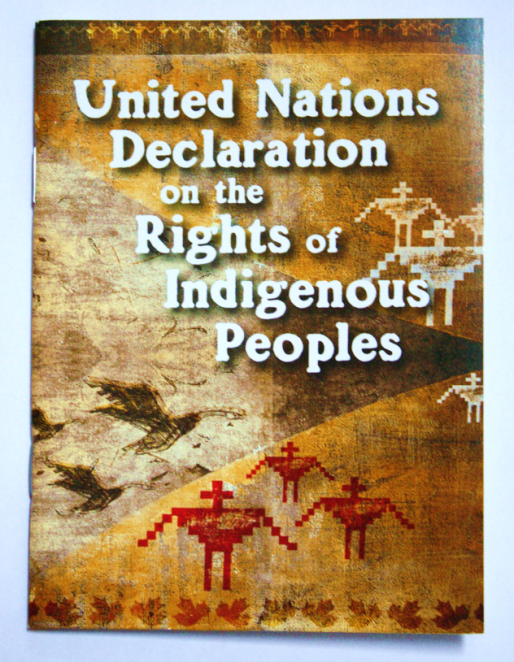Independent human rights study details unjust B.C and federal mining laws
Monday June 7, 2010: Takla Lake Traditional Territory/Takla Landing, B.C – The BC and federal governments must heed the recommendations contained in a just-released Harvard Law School report on the impacts of an “unjust” government mining regime on Takla Lake and First Nations across BC, Chief Dolly Abraham of the Takla Lake First Nation said today.
The 200-page study was initiated and funded entirely by Harvard’s International Human Rights Clinic and is its first involving indigenous peoples in Canada. It details how mining laws are stacked against Takla Lake and other First Nations in BC, describing them as in contravention of international and constitutional law, overly favourable to industry, lacking in fair compensation, and in need of “urgent law reform.”
“I strongly support this damning assessment of the provincial mining system because I know firsthand how BC law and policy are used to avoid meaningfully addressing our Aboriginal rights, title, and community concerns,” said Chief Abraham.
“For example, the provincial government’s lack of action on historic and abandoned mining sites, such as the contaminated Bralorne mercury mine and the environmental impacts of numerous past exploration sites, have resulted in roads and contaminated waste strewn across our traditional territory,” she said. “BC promised to help us clean up the legacy contamination from the mining industry, and yet no progress has been made. At the same time, BC is constantly approving exploration projects in our territory while paying little attention to our concerns”.
“When these historic impacts are combined with today’s intense exploration, you start to see large scale damages to our land and we are still not consulted or compensated for this,” said Chief Abraham, who noted Takla has still not been compensated by the province for the massive Kemess South open-pit mine, which has generated huge revenues for the BC government over the years.
“Premier Campbell and the province must heed the call for reform and sit down with First Nations to get it done, and the federal government must start living up to its international commitments and its own laws to ensure our rights are protected,” said Chief Abraham, who is a member of BC’s First Nations Women Advocating Responsible Mining (FNWARM).
FNWARM Chairperson Anne Marie Sam said: “We commend Takla Lake First Nation for cooperating with this detailed study and Harvard for devoting its resources to this analysis of the human rights issues that our members and other First Nations across BC continue to experience.
“This report exposes the rights violations and other infringements we experience as a result of unjust and outdated pro-industry BC mining laws, and the failure of the federal government to meet its duties to us as defined in its international agreements and the Canadian constitution,” said Ms. Sam, a band councilor with the Nak’azdli First Nation, which is challenging the Mt. Milligan mine in its traditional territory because of the lack of meaningful consultation and environmental concerns.
“The provincial government has to reform its impoverished attitude toward First Nations’ concerns with mining in BC, starting with the free entry system, which must be abolished, and online mineral staking,” said Ms. Sam. “The environmental review process is another major issue, and must be revised to fully address Aboriginal interests through joint decision making.”
The Harvard study found that mining “frequently prevents First Nations from using their traditional lands for subsistence and cultural practices and causes significant environmental harm,” and that First Nations generally “bear an unfair burden at every point in the mining process,” from registration of claims to exploration, production, and abandonment of closed sites.
It also found that current safeguards for First Nations and the environment in fact “favor the industry they are designed to regulate.” For example, the study highlights how the online mineral staking system, similar to British Columbia’s free entry system, gives miners legal access to First Nations lands without any specific requirement to consult or accommodate them.
The report says that despite the unfair burden that mining places upon First Nations they “do not always reap economic benefits” from the sector. It also states the province’s mining regime fails to live up to international laws and treaties that Canada has signed or domestic law, thereby leaving First Nations without the proper protection that these laws are intended to provide.
The report, “Bearing the Burden: The Effects of Mining on First Nations in British Columbia,” was authored by Bonnie Docherty, an expert on international human rights law and a lecturer with Harvard Law School’s International Human Rights Clinic, and a team of her students.
– 30 –
View the report at: http://law.harvard.edu/programs/hrp/BearingTheBurden.pdf. Or go to www.fnwarm.ca for more information and background.
Media Inquiries/Interviews:
Chief Dolly Abraham: Contact Dave Radies, Takla Lake Mining Coordinator at 604-921-2024 or 250-961-1614
Anne Marie Sam, FNWARM Chair: 250-996-7171.
Author Bonnie Docherty: Contact Cara Solomon at 617-495-9214 / csolomon@law.harvard.edu.

